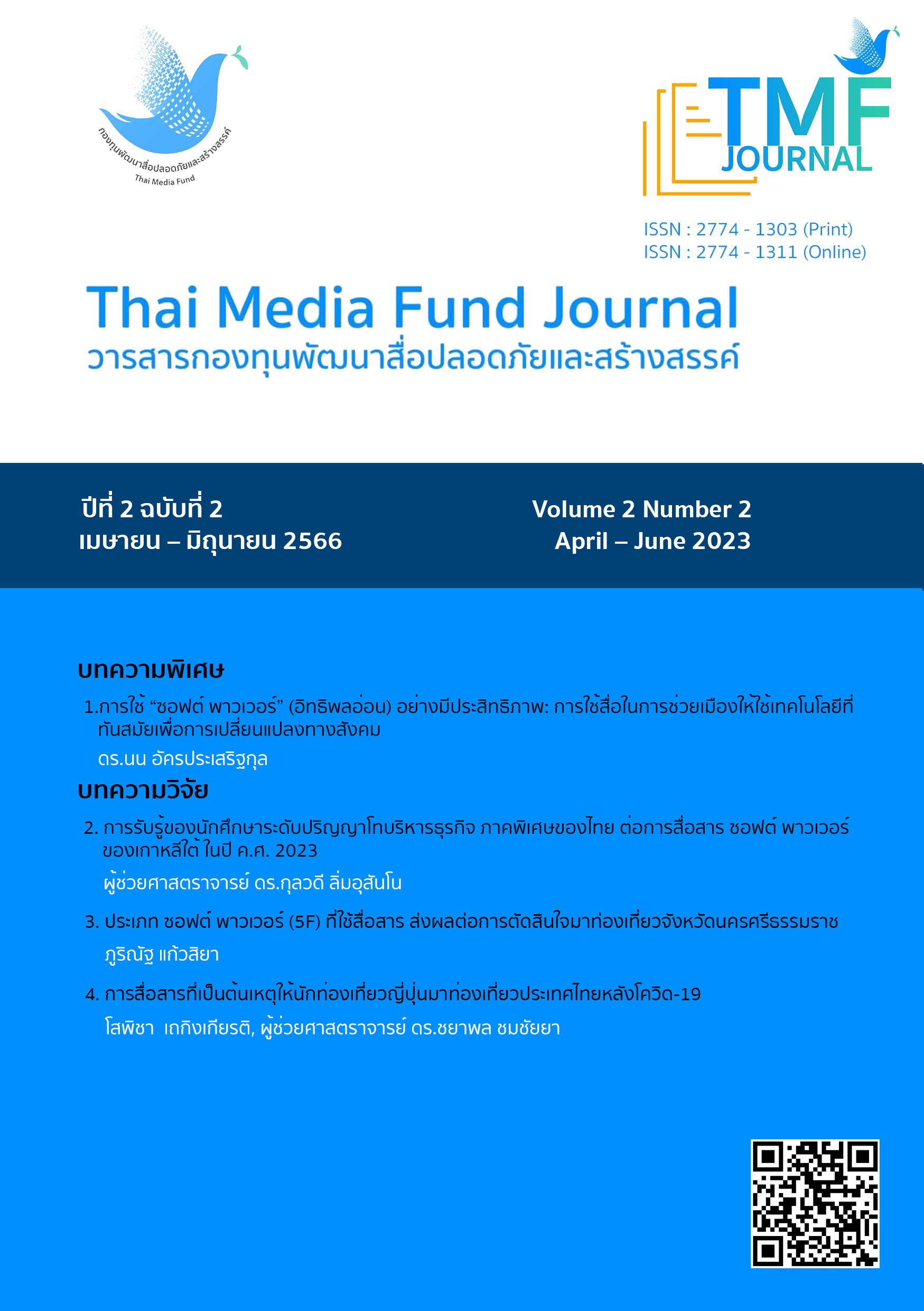การรับรู้ของนักศึกษาระดับปริญญาโทบริหารธุรกิจ ภาคพิเศษของไทย ต่อการสื่อสาร Soft Power ของเกาหลีใต้ ในปี ค.ศ. 2023
Main Article Content
บทคัดย่อ
การวิจัยนี้มีวัตถุประสงค์ เพื่อศึกษา Soft Power ของเกาหลีใต้ที่ส่งผลต่อการตัดสินใจไปท่องเที่ยวเกาหลีใต้ ของนักศึกษาระดับปริญญาบริหารธุรกิจภาคพิเศษของไทย และเพื่อศึกษาประเภทของการสื่อสาร Soft Power ของเกาหลีใต้ ที่ส่งผลต่อการรับรู้ของนักศึกษาระดับปริญญาโทบริหารธุรกิจภาคพิเศษของไทย เป็นการวิจัยเชิงคุณภาพ โดยการสัมภาษณ์เชิงลึกกับกลุ่มเป้าหมายแบบเจาะจง จากนักศึกษาระดับปริญญาโทบริหารธุรกิจภาคพิเศษ คณะวิทยาการจัดการ มหาวิทยาลัยสงขลานครินทร์ จำนวน 26 คน ระหว่างวันที่ 24-26 เมษายน พ.ศ. 2566 สถานที่ประเทศเกาหลีใต้ ผลการวิจัยพบว่า 1) เหตุผลที่มา Visit เกาหลีใต้ 3 เหตุผลใหญ่ เพราะต้องการศึกษาวัฒนธรรม วิถีชีวิต เช่น อาหาร ภาษา และ K-pop ซีรี่หนังเกาหลีใต้ ได้ท่องเที่ยวสัมผัสบรรยากาศ ของประเทศเกาหลีใต้ และการจัดการบริหารเมือง จราจร 2) การรับรู้ข้อมูลเกาหลีใต้จากเว็บไซต์ประเทศเกาหลีใต้เผยแพร่เป็นภาษาไทย จาก YouTube เกี่ยวกับเกาหลีใต้ จากการบอกเล่าของบริษัททัวร์ จากเฟสบุ๊ครวมพลคนรักเกาหลี จาก Google, ซีรี่เกาหลี, TikTok และจากรายการโทรทัศน์, IG, Lemon8, การกดแชร์จากเพื่อน, อ่านรีวิว, รู้จากญาติที่มาอาศัยในเกาหลี ตามลำดับ 3) Soft Power ที่ทำให้กลุ่มตัวอย่างประทับใจ ได้แก่ บ้านเมืองสะอาด การเคารพกฎหมาย วัฒนธรรมการรับประทานอาหาร ธรรมชาติอากาศ การแต่งกายสมัยก่อน เทคโนโลยีล้ำหน้า และมีผลิตภัณฑ์เสริมความงาม ตามลำดับ และ 4) เหตุผลหลัก ๆ ที่จะกลับมาเกาหลีใต้อีก 1) ชอบบรรยากาศ และอากาศเย็นสบาย 2) ต้องการศึกษาวัฒนธรรมอื่น ๆ เพิ่มเติม 3) ต้องการเดินทางไปจังหวัดอื่น ๆ ของเกาหลีใต้
Article Details

อนุญาตภายใต้เงื่อนไข Creative Commons Attribution-NonCommercial-NoDerivatives 4.0 International License.
เอกสารอ้างอิง
Brown, B. (2010). The gifts of imperfection. Center City, MN: Hazelden Publishing.
Bruner, J. S. (1990). Acts of meaning. Cambridge, MA: Harvard University Press.
Chua, B. H., & Iwabuchi, K. (Eds.). (2018). K-pop: The international rise of the Korean music industry. Routledge.
Dewey, J. (1910). How we think. Boston, MA: D. C. Heath & Co.
Fisher, B. A., & Stelter, B. (2020). Interpersonal communication: Competence and contexts (3rd ed.). New York, NY: Oxford University Press.
Iwabuchi, K. (2019). Trans-Asian cultural flows and soft power:
The case of Korean TV dramas in East and Southeast Asia. Media International Australia, 172(1), 60-72.
Jin, D. Y. (2010). Korean wave: a new pop culture phenomenon. Media, Culture & Society, 32(3), 479-491.
Jang, H. J. (2015). Digital diplomacy and transnational cultural flows: Korean pop culture and the politics of mobility in the digital age. The International Communication Gazette, 77(5), 443-459.
Kim, J., & Kim, Y. (2018). The impact of Hallyu on tourist behavior and destination image: Focused on the Chinese market. Journal of Travel & Tourism Marketing, 35(2), 199-213.
Kim, H. (2014). The impact of Korean pop culture on Taiwanese high school students’ consumption of Korean popular music. Inter-Asia Cultural Studies, 15(3), 437-454.
Morse, J.M. (1994) The cognitive processes of analysis in qualitative inguiry. In J. M. Morse (Ed.), Critical issues in qualitative research Methods (PP. 23-43). Thousand Oak, CA: Sage
Prasertsuk, K. (2018). South Korea's soft power: Strengths and limitations. International Journal of East Asia Studies, 122.
Rattanakul-Sereereungrit, P. (2022). Commerce decode success Soft Power South Korea prepares to adapt to Thailand, confident to support GDP growth. Retrieved from https://www.infoquest.co.th/2022/179899
Sae-ung, K. (2019). Soft power policy and cultural exports of South Korea, 1997-present. Research article for Bachelor of Arts, Department of Asian Studies, Faculty of Arts, Silpakorn University.
Sinek, S. (2009). Start with why. New York, NY: Portfolio.
Tantiwittayapitak, W. (2022). Change the ministry of culture grade c to be the spearhead of soft power. Retrieved from https://www.the101.world/ministry-of-culture-to-soft-power/
West, R., & Turner, L. H. (2018). Introducing communication theory: Analysis and application (6th ed.). New York, NY: McGraw-Hill Education.


